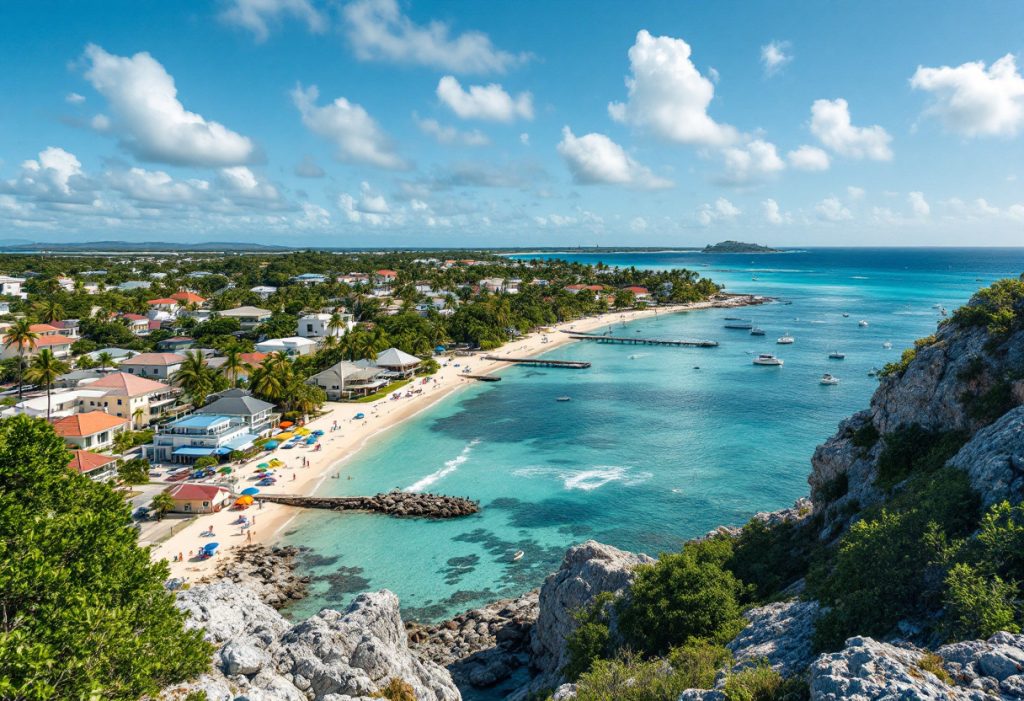Chasing Crypto Sunshine: Top Destinations for Investors Seeking New Shores

Introduction:
The advent of cryptocurrencies has not only revolutionized finance but has also given rise to a new class of globally mobile individuals: the crypto investor. Fortunes built on blockchain technology are prompting many to explore international relocation, driven by a desire to find jurisdictions that not only acknowledge but actively embrace their digital assets. This movement is fueled by various factors, prominently the burden of high taxes in their home countries, which can significantly erode the value of their holdings. Beyond financial considerations, these investors, often digital natives themselves, seek lifestyles that resonate with their innovative and forward-thinking ethos, leading them to countries where technological advancement is celebrated and wealth is nurtured.
Pay 0% Tax Legally — Start Your Tax-Free Strategy Today
Even in low-tax jurisdictions, most investors still overpay.
Our elite partner tax law firms specialize in advanced legal structures that can reduce your effective tax rate to as low as 0%, fully compliant, audit-ready, and tailored to your profile.
Crypto-friendly. International. Proven.
The search for an ideal “crypto haven” involves a multifaceted evaluation. This report will analyze the key determinants that make a country appealing to cryptocurrency expatriates. Foremost among these is a favorable tax regime, allowing investors to retain more of their hard-earned gains. However, financial advantages alone are insufficient.
A high quality of life, encompassing factors such as healthcare, safety, and infrastructure, is crucial for a comfortable and secure transition. Political and economic stability provides a bedrock of security for both personal well-being and financial assets. The ease with which residency or even citizenship can be obtained is another significant consideration, streamlining the process of relocation. Furthermore, a vibrant local cryptocurrency ecosystem, complete with exchanges, blockchain businesses, and community support, offers opportunities for engagement and growth.
Finally, a realistic understanding of the potential risks and challenges associated with expatriation to these locations is essential for informed decision-making. This report aims to provide a comprehensive overview of the top contenders, enabling sophisticated cryptocurrency investors to chart a course toward a new international home that aligns with their financial objectives and lifestyle aspirations.
The Allure of Low Taxes: Jurisdictions Where Crypto Gains Thrive
Singapore
Singapore has firmly established itself as a leading destination for cryptocurrency investors, earning the moniker of a crypto tax haven. The city-state imposes no Capital Gains Tax on cryptocurrencies for both individuals and businesses, a policy that directly enhances the profitability of crypto investments .

This favorable tax treatment is complemented by a proactive regulatory environment. The Monetary Authority of Singapore (MAS) actively oversees digital assets through the Payment Services Act, ensuring a level of clarity and security that attracts both startups and established investors . This regulatory foresight has positioned Singapore as a premier hub, evidenced by the presence of major cryptocurrency exchanges like KuCoin and Phemex, which have chosen Singapore as their base of operations . The absence of capital gains tax allows investors to maximize their returns, while the active regulatory landscape fosters a sense of trust and legitimacy within the burgeoning crypto industry.
The concentration of prominent exchanges further solidifies Singapore’s status as a supportive ecosystem. However, it is important to note that while capital gains remain untaxed, income derived from crypto-related activities, such as salaries paid in cryptocurrency or profits generated by businesses dealing in digital assets, is subject to Singapore’s income tax laws.
Additionally, a Goods and Services Tax (GST) of 9% is applied to the fees associated with buying, selling, or converting cryptocurrencies on platforms like Coinbase, representing a transactional cost for active traders . This nuanced approach suggests that Singapore favors passive investment gains while treating active income generation within the crypto sphere similarly to traditional income sources. Therefore, investors must carefully distinguish between these income types for effective tax planning in Singapore.
Switzerland
Switzerland, particularly the canton of Zug, famously known as “Crypto Valley,” has long been a global epicenter for blockchain innovation. The country offers a similarly attractive tax landscape for cryptocurrency investors, with no capital gains tax levied on individuals who hold cryptocurrencies as part of their private investment portfolios .

This policy, coupled with Switzerland’s enduring reputation for financial stability and technological advancement, makes it a compelling choice for those considering expatriation . The presence of specialized “crypto-native” banks further underscores Switzerland’s commitment to accommodating the needs of the digital asset community .
The stability of the Swiss regulatory climate and the country’s deep financial roots create an ideal environment for blockchain entrepreneurs, ranging from cutting-edge startups to established financial institutions venturing into the crypto space. However, the Swiss tax authorities draw a distinction between private investors and professional traders. While the former generally enjoy tax-free capital gains, they are subject to an annual wealth tax on their total assets, including cryptocurrencies, if the aggregate value exceeds a specified tax-free allowance .
Conversely, individuals classified as professional traders are subject to income tax on their profits derived from trading activities . Furthermore, income generated from crypto mining and staking is typically treated as taxable income under Swiss law . This distinction necessitates that investors carefully assess the nature and scale of their crypto activities to understand their specific tax obligations in Switzerland, with long-term individual investors generally benefiting most from the capital gains tax exemption.
The United Arab Emirates (UAE)
The United Arab Emirates (UAE), with Dubai and Abu Dhabi at its forefront, has made significant strides in establishing itself as a prominent global hub for the cryptocurrency industry. The nation boasts a highly attractive tax regime, featuring zero personal income tax, which extends to all earnings from cryptocurrency investments and trading .

This complete absence of personal income tax provides a substantial financial advantage for crypto investors, allowing them to retain the entirety of their profits without taxation at the individual level. The UAE has also demonstrated a strong commitment to fostering the growth of the crypto sector through proactive regulatory measures. Dubai, in particular, has established the Virtual Asset Regulatory Authority (VARA), a dedicated body responsible for providing a well-defined and comprehensive framework for digital assets, ensuring clarity and security for businesses and investors alike . This forward-thinking regulatory approach signals the UAE’s ambition to become a leading center for crypto innovation and investment.
While the absence of personal income tax is a major incentive, it is important to note that businesses operating within mainland UAE are subject to a 9% corporate tax on profits exceeding AED 375,000, a regulation that came into effect in June 2023 . However, businesses located within the various Free Zones established in the UAE may be eligible for exemptions from this corporate tax . Additionally, the UAE has exempted cryptocurrency transactions from Value Added Tax (VAT), further enhancing its appeal as a crypto-friendly jurisdiction .
This tax structure positions the UAE as a highly favorable location for individual crypto investors seeking to maximize their after-tax returns, while businesses need to consider their specific location and potential corporate tax obligations.
Malaysia
Malaysia presents another compelling option for cryptocurrency investors seeking a jurisdiction with a favorable tax environment. Notably, Malaysian authorities do not classify cryptocurrencies as either capital assets or legal tender.
This unique classification results in tax-free crypto transactions for individual investors, as these transactions are not subject to capital gains tax . This straightforward approach can be particularly appealing to investors looking for simplicity in tax regulations. The absence of capital gains tax on cryptocurrency for individuals makes Malaysia an attractive destination, especially for those whose investment activities are not considered a professional trading endeavor .

However, the Malaysian Inland Revenue Board maintains a distinction for individuals who engage in repetitive cryptocurrency trading with the intention of earning income. Such individuals may be deemed to be operating a business, and consequently, their profits from these trading activities would be subject to income tax . This caveat highlights the importance for investors to consider the nature and frequency of their trading activities to determine their tax obligations.
Furthermore, it is worth noting that there have been indications of potential future changes to Malaysia’s tax laws regarding capital gains, suggesting that the current tax-free status for individual crypto investors might not be permanent . The Inland Revenue Board has also initiated enforcement actions, such as “Ops Token,” targeting individuals and businesses involved in undeclared digital asset transactions, underscoring the need for compliance with existing tax regulations, particularly for those engaged in trading as a business .
The Cayman Islands
The Cayman Islands have long held a prominent position as a classic tax haven, and this status extends seamlessly into the realm of cryptocurrencies.
The jurisdiction imposes no capital gains tax, income tax, or corporate tax, making it an exceptionally attractive destination for both individual and business cryptocurrency investors seeking to minimize their tax liabilities . The Cayman Islands Monetary Authority further reinforces this tax-neutral environment by imposing no direct taxes on residents or businesses . This lack of direct taxation on income and capital gains simplifies the financial landscape for those holding and trading cryptocurrencies.

While the Cayman Islands have established a regulatory framework for virtual asset service providers through the Virtual Asset (Service Providers) Act (VASP Act), the act does not specifically regulate or prohibit the ownership or trading of digital assets for personal use . This approach provides a high degree of freedom for individual crypto investors. Although crypto mining and staking activities are not explicitly regulated or prohibited within the Cayman Islands, practical considerations such as the high cost of electricity and potential import duties on specialized equipment may deter large-scale mining operations within the jurisdiction .
Nevertheless, for investors primarily focused on holding and trading cryptocurrencies with minimal tax implications, the Cayman Islands offer a straightforward and compelling environment.
Beyond these top contenders, several other countries offer varying degrees of tax advantages for cryptocurrency investors.
Germany provides an appealing incentive for long-term holders, with gains from cryptocurrencies held for over one year being entirely tax-free for individuals . However, short-term gains and income derived from activities such as mining and staking are subject to the individual’s income tax rate .
Portugal, once considered a crypto tax paradise, has recently shifted its stance, now taxing short-term capital gains (held for less than a year) at a flat rate of 28% for non-Non-Habitual Resident (NHR) individuals. Despite this change, long-term holdings can still qualify for tax-free status . El Salvador, which made headlines by adopting Bitcoin as legal tender, initially offered no tax on Bitcoin gains. However, its legal tender status has been rolled back, creating some uncertainty regarding the broader tax treatment of cryptocurrencies .
Belarus provided a temporary tax-free regime for all crypto-related activities, including mining and trading, until 2025 . The future regulatory landscape beyond this period remains uncertain . Georgia stands out by offering no income tax on profits that individuals receive from selling cryptocurrency .
Hong Kong, while imposing no capital gains tax, meaning profits from crypto trading are generally not taxed, does subject businesses dealing in cryptocurrencies to its profits tax . Finally, Panama, operating on a territorial tax system, does not tax foreign-sourced income, making profits from cryptocurrency transactions conducted outside of Panama exempt from local taxation.
Life Beyond the Ledger: Quality of Life and Affordability
While favorable tax laws are a primary driver for cryptocurrency investors considering expatriation, the quality of life and affordability of a potential new home are equally important considerations.
Singapore, while boasting a top-tier quality of life, modern infrastructure, and a vibrant cultural scene, consistently ranks among the most expensive cities globally, particularly concerning housing costs . Its advanced healthcare system and efficient public transportation are significant advantages, but the high cost of living, especially for accommodation, can be a major factor for investors to weigh .
Switzerland mirrors Singapore in offering an exceptional quality of life and a robust crypto ecosystem, but it too comes with some of the highest living costs worldwide, with cities like Zurich and Geneva being particularly pricey . The country’s excellent but expensive healthcare and efficient yet costly public transportation system, alongside its renowned political stability and safety, present a trade-off that requires substantial financial planning .
The United Arab Emirates (UAE), particularly Dubai and Abu Dhabi, provides a high quality of life and modern infrastructure, attracting a diverse expatriate community . While living costs can be substantial, especially for housing and education in the major cities, the absence of personal income tax can help offset these expenses . The UAE’s high-quality healthcare, often covered by employers, and its modern transportation network contribute to its appeal .
Malaysia offers a compelling contrast, providing a comfortable standard of living with a significantly lower cost of living compared to many Western countries and even its regional neighbors like Singapore . Its affordable healthcare and well-developed public transportation in urban areas, coupled with a pleasant quality of life ranking within Asia, make it a financially accessible option for crypto investors .
The Cayman Islands present a unique scenario, offering a high quality of life synonymous with a premier offshore financial center and luxury tourist destination . However, this comes at the cost of extremely high living expenses, ranking it among the most expensive places to live globally . While the absence of income tax is a major draw, the exorbitant costs of housing, food, and healthcare necessitate careful budgeting and significant financial resources .
Other jurisdictions offer varying levels of quality of life and affordability. Germany provides a moderate cost of living and a high quality of life, particularly in its major cities . Portugal stands out for its lower cost of living compared to many other Western European nations, coupled with a pleasant climate and a high quality of life, making it an attractive destination for expatriates . El Salvador generally offers an affordable cost of living, but challenges with infrastructure and safety can be considerations . Belarus boasts a very low cost of living, but its political and social environment presents instability . Georgia offers low living costs, especially outside its capital, Tbilisi, and an emerging startup ecosystem . Hong Kong, a global financial hub, is characterized by an extremely high cost of living, particularly for housing, though it offers a high quality of life and efficient infrastructure . Finally, Panama presents a moderate cost of living, lower outside Panama City, along with a favorable climate and tax policies, making it a potentially attractive option .
Safe Harbors: Political and Economic Stability for Crypto Wealth
For cryptocurrency investors considering international relocation, the political and economic stability of a host country is paramount, providing a secure environment for their assets and personal well-being.
Singapore stands out as a bastion of stability, boasting a highly stable political environment, a robust and consistently growing economy, low unemployment rates, and effective enforcement of anti-corruption laws . Its pro-business stance and open economy further solidify its reputation as a secure destination for international investors .
Switzerland is similarly renowned for its long-standing political neutrality and stability, underpinned by a strong and diverse economy and a low level of public debt . The country’s strong protection of property rights and deeply ingrained culture of low tolerance for corruption contribute to its appeal as a safe haven for crypto wealth .
The United Arab Emirates (UAE) offers a politically stable environment with a rapidly expanding economy that is strategically focused on diversifying beyond its traditional reliance on oil revenues . Its strong trade and investment relationships, particularly with major global economies like the United States, further underscore its reliability as an investment destination .
Malaysia, after a period of political transition, is demonstrating signs of renewed political stability, coupled with steady economic growth and a diversified economic base . The government’s active implementation of reforms aimed at reducing bureaucratic hurdles and promoting economic expansion signals a positive outlook for long-term stability .
The Cayman Islands have historically maintained a remarkably stable economic and political climate . As a British Overseas Territory with the strongest and one of the most stable economies in the Caribbean, it offers a secure and reliable environment particularly attractive for financial investments .
Other nations present a more varied picture. Germany, while a strong and stable democracy, has faced recent challenges with economic stagnation and increasing political fragmentation . Portugal’s economy has shown steady growth, but potential political instability has been identified as a near-term risk . El Salvador has historically grappled with corruption and gang violence, although recent improvements have been noted; however, its economy remains vulnerable . Belarus faces significant risks due to its highly state-controlled economy, weakened by international sanctions, and its politically unstable environment . Georgia’s economy has demonstrated resilience, but a recent political crisis has introduced uncertainty into its business landscape, further compounded by concerns over increasing Russian influence . Hong Kong, despite its highly developed free-market economy with strong fundamentals, has experienced some impact on its political stability in recent years . Panama, while maintaining a stable democratic government and a dollarized economy, has a political framework that is considered somewhat fragile.
Your Gateway to a New Life: Residency and Citizenship for Crypto Investors
Obtaining the right to live and work in a new country is a crucial step for cryptocurrency investors looking to expatriate. Several nations offer specific programs or pathways that may be of interest.
Singapore
Singapore provides a route to permanent residency through its Global Investor Programme (GIP), which is open to eligible global investors with a substantial business track record . While the program doesn’t explicitly mention cryptocurrency investments, individuals with significant wealth derived from crypto may qualify if they meet the substantial investment criteria, which requires at least SG$10 million invested in a new or existing business or a GIP-approved fund, and can demonstrate a successful entrepreneurial background .
Switzerland
Switzerland offers non-EU nationals two primary avenues for obtaining residency: Swiss Company Formation, tailored for investors and businesspeople aiming for permanent residency by creating job opportunities and contributing to economic growth, and Swiss Lump Sum Taxation, which caters to affluent individuals and retirees who can secure residency by paying an annual lump sum tax fee starting at CHF 150,000, varying by canton . Both pathways could be viable for successful cryptocurrency investors depending on their preference for active business involvement or a more passive residency based on wealth.
The United Arab Emirates (UAE)
The United Arab Emirates (UAE) offers a relatively straightforward path to long-term residency for those with capital. Its 10-year Golden Visa can be obtained by purchasing real estate with a minimum value of AED 2,000,000 (approximately $545,000) . The UAE also offers a 2-year residency visa for lower investments in real estate . For cryptocurrency investors who have converted their digital assets to fiat currency, investing in UAE real estate can be an accessible route to securing long-term residency.
Malaysia
Malaysia offers a range of long-term visa options through its Malaysia My Second Home (MM2H) program, which features different tiers with varying requirements for fixed deposits and property investments, starting from a fixed deposit of USD 150,000 for the Silver Tier . Additionally, the Premium Visa Program (PVIP) provides a 20-year residency visa with a minimum investment of RM 1 million . These programs offer various pathways for cryptocurrency investors to establish long-term residency in Malaysia, with options to suit different financial capacities.
The Cayman Islands
The Cayman Islands provide residency certificates for individuals of independent means and investors. Permanent residency can be achieved through a significant real estate purchase valued at US$2.4 million or higher . Financial requirements differ based on whether the residency is sought in Grand Cayman or the smaller islands of Little Cayman and Cayman Brac . For high-net-worth cryptocurrency investors, investing in Cayman real estate can be a direct route to obtaining residency in this tax-neutral jurisdiction.
Other countries offer alternative routes :
Germany does not have a specific “Golden Visa” program, but it does offer residency to those who make a business investment that meets certain economic needs and creates at least five full-time jobs.
Obtaining German citizenship requires residing in the country for a specified period.
Portugal‘s Golden Visa program provides residency through various investment options starting from €250,000, including investments in funds, arts, or scientific research, though real estate investment is no longer an eligible option .
El Salvador offers an “Economic Residency” visa with a $100,000 investment in business, real estate, or government programs, and also has a “Freedom Passport” program offering citizenship for a $1 million Bitcoin donation.
Georgia provides residency for investments of at least $100,000 in real estate or $300,000 in a business .
Hong Kong‘s Capital Investment Entrant Scheme (CIES) requires a minimum investment of HKD 30 million and offers eligibility for permanent residence after seven years .
Panama‘s Qualified Investor Visa grants permanent residency with investments starting at $300,000 in real estate, $500,000 in securities, or $750,000 in a bank deposit .
Belarus does not offer a direct residency by investment program.
A Hub for Hodlers: The Local Crypto Ecosystem
A thriving local cryptocurrency ecosystem can provide valuable resources, networking opportunities, and a sense of community for expatriating investors.
Singapore
Singapore stands out with its mature and comprehensive cryptocurrency ecosystem. As a major financial center, it is home to numerous global companies in the Web3 and crypto industries . The government’s progressive regulatory environment, coupled with strong support for innovation, has fostered a thriving startup ecosystem . Singapore boasts numerous cryptocurrency exchanges, blockchain-related businesses, and an active community, hosting events like Blockchain Week . Universities in Singapore also offer blockchain-related programs, further strengthening the ecosystem .
Switzerland
Switzerland, particularly its “Crypto Valley” in Zug, is a globally recognized leader in blockchain innovation, home to over 1000 companies, including prominent projects like Ethereum, Cardano, and Tezos . The country’s strong financial infrastructure and technological prowess, combined with active government support for blockchain development, create a rich ecosystem for investors .
The United Arab Emirates (UAE)
The United Arab Emirates (UAE), with Dubai and Abu Dhabi leading the charge, is rapidly developing its cryptocurrency ecosystem with the aim of becoming a global hub . Dubai’s well-defined regulatory framework through VARA, along with crypto-friendly free zones, is attracting businesses and investment . The traditional financial sector in the UAE is also increasingly embracing blockchain technology, and the country boasts high rates of cryptocurrency adoption .
Malaysia
Malaysia has a developing cryptocurrency ecosystem with growing adoption of blockchain technology and digital assets . The government has established regulations for digital assets and exchanges, and over 840,000 Malaysians have opened accounts with regulated digital asset exchanges, indicating a significant level of user engagement .
The Cayman Islands
The Cayman Islands are actively embracing fintech and digital asset businesses, positioning themselves as a crypto-friendly jurisdiction with a clear regulatory framework through the VASP Act . The convergence of virtual assets with sectors like real estate is growing, and several cryptocurrency exchanges have a presence in the Cayman Islands .
Other countries also have notable, though sometimes less mature, crypto ecosystems. Germany is a key hub for blockchain startups and serves as a bridge between traditional and decentralized finance, with growing institutional interest in digital assets . Portugal is emerging as a crypto hub in Europe, particularly Lisbon, which hosts international crypto events and boasts a growing blockchain ecosystem . El Salvador initially aimed to build a significant Bitcoin ecosystem but has faced challenges, and its regulatory landscape is still evolving . Belarus had ambitions to create a “crypto paradise” with favorable regulations . Georgia has become a top country for crypto mining due to its low tax restrictions and operational costs . Hong Kong is actively embracing blockchain and DLT, aiming to establish a vibrant ecosystem for virtual assets, with a developing regulatory framework for virtual asset trading platforms . Panama, while lacking comprehensive crypto-specific regulations, has a growing interest in the sector and the potential to become a regional hub.
Navigating the Currents: Risks and Challenges for Crypto Expats
While the allure of low taxes and a vibrant ecosystem is strong, cryptocurrency investors must also be aware of the potential risks and challenges associated with expatriating to these locations.
In Singapore, despite its robust regulatory framework, there is a growing concern regarding rising fraud cases related to cryptocurrency, prompting warnings from government officials about the risks involved . This highlights the need for investors to exercise caution and remain vigilant against scams even within a regulated environment.
Switzerland, while progressive in its approach, remains cognizant of the risks associated with digital assets, particularly concerning money laundering, terrorist financing, and investor protection, as highlighted by warnings from FINMA . The inherent volatility of digital assets also remains a significant factor to consider .
The UAE, while developing a strong regulatory framework, has seen instances of fraudulent crypto schemes and the promotion of unlicensed investments, which are now being actively criminalized . Money laundering remains a significant concern in the crypto sector, and investors should be aware of the potential for market volatility .
Malaysia, despite having established regulatory frameworks, still faces some regulatory uncertainty . The tax authorities are actively pursuing undeclared crypto transactions, and the potential for future changes in tax regulations adds an element of risk for investors .
The Cayman Islands, while offering tax neutrality, acknowledge the need for further regulatory clarity in the crypto space . For many investors, however, the primary challenge might be the exceptionally high cost of living, which could offset the financial benefits of the zero-tax regime .
In other jurisdictions, specific risks exist. Germany’s tax laws for cryptocurrencies can be complex, and the ongoing implementation of MiCA requires businesses to ensure timely compliance . Portugal has recently changed its tax laws, now taxing short-term gains, and requires compliance with AML/CFT regulations . El Salvador’s experiment with Bitcoin as legal tender has faced significant challenges and has been partially reversed, creating uncertainty in its crypto regulatory landscape . Belarus presents risks due to its political and economic instability and the temporary nature of its tax-free crypto regime . Georgia’s political situation and increasing Russian influence are potential concerns . Hong Kong’s very high cost of living is a major challenge, and its regulatory framework for virtual asset trading platforms is still developing, with new tax transparency rules on the horizon . Panama’s lack of comprehensive crypto-specific regulations creates uncertainties, and there is potential for increased international pressure to adopt stricter rules.
Comparative Analysis: Weighing the Options
To provide a clear overview for cryptocurrency investors considering expatriation, the following table summarizes the key attributes of the top identified countries: Singapore, Switzerland, UAE, Malaysia, and the Cayman Islands.
| Country | Capital Gains Tax (Individuals) | Income Tax (Crypto Activities) | Cost of Living Index (vs. NYC) | Ease of Obtaining Residency | Cryptocurrency Ecosystem | Political/Economic Stability |
| Singapore | 0% | Yes | 81.7 | Difficult | Mature & Comprehensive | Very High |
| Switzerland | 0% (Generally) | Yes (For Professionals) | 101.1 | Moderate | Mature & Leading | Very High |
| UAE | 0% | No | 55.8 | Moderate | Developing & Strong | High |
| Malaysia | 0% | Yes (For Frequent Traders) | 30.0 | Relatively Easy | Developing | Moderate & Improving |
| Cayman Islands | 0% | No | 92.1 | Difficult | Developing | Very High |
Note: Cost of Living Index data is from Wise.com (January 2025) . Ease of Obtaining Residency is a subjective assessment based on program requirements. Cryptocurrency Ecosystem and Political/Economic Stability are also subjective ratings based on the analysis in the report.
This table highlights the trade-offs inherent in choosing a jurisdiction. Singapore and Switzerland offer mature crypto ecosystems and high stability but come with very high living costs. The UAE provides the significant advantage of zero personal income tax and a developing ecosystem, though it is also relatively expensive. Malaysia stands out for its low cost of living and no capital gains tax for most individuals, but its ecosystem is less developed than the others. The Cayman Islands offer unparalleled tax neutrality but are burdened by an extremely high cost of living.
Conclusion: Finding Your Ideal Crypto Haven
The landscape of attractive destinations for cryptocurrency investors seeking to expatriate is diverse, with each country presenting a unique blend of advantages and disadvantages. Singapore and Switzerland stand as titans in the crypto world, offering robust ecosystems and favorable tax policies for holding, but their high costs of living demand significant financial resources. The UAE emerges as a compelling option with its enticing zero personal income tax, rapidly growing crypto infrastructure, and high quality of life, although investors should be mindful of the costs associated with major urban centers. Malaysia provides a financially accessible route with its lack of capital gains tax for most individuals and a low cost of living, making it particularly attractive for those prioritizing affordability. Finally, the Cayman Islands, a traditional tax haven, extend their tax-neutral embrace to cryptocurrencies, but the exceptionally high cost of living requires substantial wealth.
Pay 0% Tax Legally — Start Your Tax-Free Strategy Today
Even in low-tax jurisdictions, most investors still overpay.
Our elite partner tax law firms specialize in advanced legal structures that can reduce your effective tax rate to as low as 0%, fully compliant, audit-ready, and tailored to your profile.
Crypto-friendly. International. Proven.
Ultimately, the “best” country for a cryptocurrency investor to call home hinges on their individual priorities. Those prioritizing minimal taxation above all else might find the Cayman Islands or the UAE most appealing. Investors seeking a mature and regulated crypto environment, even with a higher cost of living, might gravitate towards Singapore or Switzerland. For those balancing tax advantages with affordability and a developing ecosystem, Malaysia could be the ideal choice. As the global landscape of cryptocurrency regulation continues to evolve, and as individual preferences for lifestyle and financial optimization vary, the decision of where to establish a new international base requires careful consideration and a thorough understanding of the nuances each jurisdiction offers. The quest for the perfect crypto haven is a personal journey, and the ideal destination is the one that best aligns with an investor’s unique circumstances and aspirations in this dynamic and ever-changing world of digital finance.